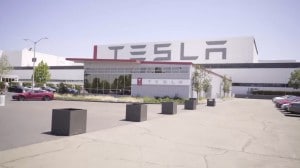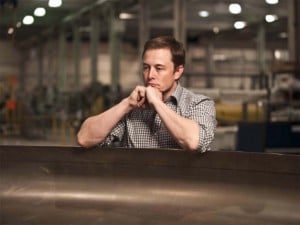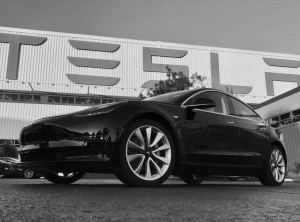
The National Labor Relations Board has filed a formal complaint against Tesla, finding merit to a series of charges involving the company’s treatment of employees over the past months, including claims that union supporters were swept out in a mass firing.
Charges, cited by the NLRB, range from terminating employees in retaliation for engaging in union and/or protected activities to unlawful interrogations of union supporters. Many of the pro-union employees were fired last fall when Tesla dismissed nearly 1,000 employees for what it described as substandard job performance.

Tesla has yet to file an answer to the complaint lodged by the NLRB but denied the allegations when the union fielded the charges last autumn. It will have to come up with a response before a trial date now set for June 11.
The move by the NLRB comes as Tesla is facing a wide range of problems, including a fatal crash of a Model X SUV that has triggered a separate federal probe, as well as a recall announced last week covering about half of all the vehicles it has produced so far.

There also have been claims leveled by some current and former employees that the company has been struggling to cope with a high level of defective parts at its Fremont, California assembly plant.
That’s the same plant that has been in the midst of what CEO Elon Musk last year described as “production hell” as it struggles to ramp up output of the critical Model 3 launched last July. Tesla this week announced that it is now rolling out about 2,000 of the battery-sedans a week, a fourfold increase over fourth quarter 2017 production – but still 20% less than the company had targeted by the end of this year’s first quarter.
(Tesla downplays production lag and investors appear to agree. Click Here for the latest.)
At the time of last year’s mass firings, Tesla said it aimed to address productivity and quality issues.
The complaint filed by the NLRB alleges that with its conduct Tesla has been “interfering with, restraining and coercing employees in the exercise of their rights,” which are guaranteed under the National Labor Relations Act
“The Respondent has been discriminating in regard to the hire or tenure or terms or conditions of employment of its employees, thereby discouraging membership in a labor organization in violation of the NLRB act,” the NLRB charged in its complaint.
(Click Here for details on the multi-billion dollar pay package shareholders approved for Elon Musk.)
The federal filing was welcomed by pro-union workers and the United Auto Workers Union, which has been hoping to gain representation rights in Fremont.

“I’m pleased that the NLRB has found merit to these charges and is taking Tesla to trial on my termination,” said Richard Ortiz, a former Production Associate and union supporter who was fired late last year.
“I know in my heart that what they did was wrong, and I look forward to our day in court,” Ortiz added.
“The truth is on my side. I have done absolutely nothing wrong. I had an excellent work record, and the only thing I did was try to improve the lives of my coworkers.”
Jose Moran, another Fremont workers who was fired after expressing support for a union, said he “knew that speaking up would make me a target.” He said he was subsequently “singled out and interrogated.
Moran said he and other fired co-workers “will continue to speak up, and continue to work to make Tesla a better and safer company. Today’s action makes clear that we have rights, that we can keep talking about what we’re seeing and experiencing at Tesla.”
The mass firings also roughly coincided with the release of documents by a pro-union group that alleged serious safety problems at the Fremont factory. Tesla did acknowledge that it had a higher than industry-average record of worker injuries in earlier years at the plant, but it countered with documentation it said showed that it had successfully reduced the injury rates.
The new NLRB complaint could further complicate things for Tesla at a time when it is struggling to prove that recent setbacks are only temporary. After announcing the latest production numbers this week, the carmaker also addressed concerns that it was running out of cash, stating that because of further, anticipated jumps in output, “Tesla does not require an equity or debt raise this year, apart from standard credit lines.”
(Tesla could find itself in crosshairs if Trump trade dispute with China escalates. Click Here to learn why.)








Good for him! I wish more manufacturers would get rid of the vulture unions…..maybe then a truck wouldn’t cost $80K!
You do realize, Mike, that labor contributes less than 11% of the cost of a vehicle? Or that non-union plants offer only slightly lower wages and benefits? There ARE differences in work rules, though the cost differential is certainly not why your truck costs what it does. One reason the unions did make inroads at Tesla was because of high injury rates. Tesla claims they have come down, though that is not yet validated. But they were running substantially higher than at other US auto plants.
Neither defending nor calling out unions, but it helps to have your facts at hand.
Thanks, Paul, for a measured and logical response.
An $80K truck is going to be an uplevel trim with lots of bells and whistles, anyway!
Correction, labor contributes 100% of everything we buy. Steel, aluminum, plastic (oil) costs nothing coming out of the ground but for the labor to process it. Unions think they hold the trump card till the clever capitalists find a way to minimize/eliminate labor costs (machines, robots, moving offshore, …). Recall your story about the excessive union raping at the Detroit Auto Show (half day crew of electricians to plug in an extension cord); capitalist answer: “We ain’t coming back!”